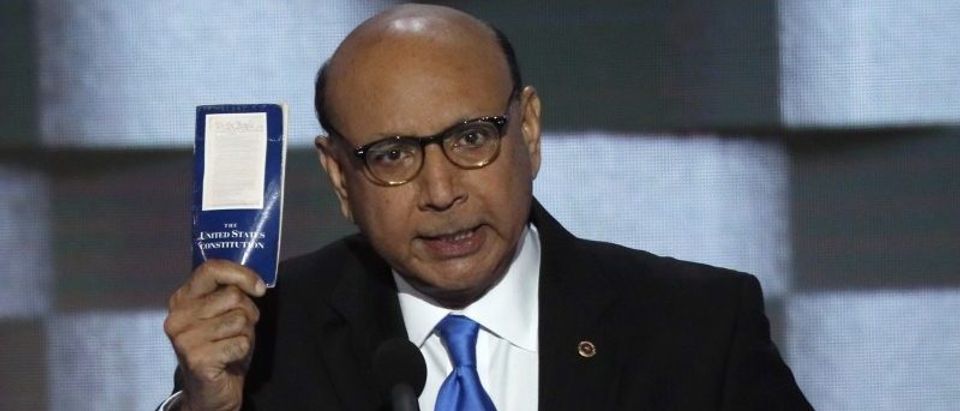It has been said that Elián González defeated Al Gore in 2000. Who knows if that’s actually true, but—more frequently than we might imagine—election-year political narratives are shaped by unlikely or unexpected civilians. That’s exactly what is happening right now with regard to the story of Khizr and Ghazala Khan, the Muslim parents of a fallen soldier.
This has become an almost quadrennial tradition. I’m reminded of what happened in 2008, when then-Sen. Barack Obama wandered into Joe Wurzelbacher’s Ohio neighborhood and decided to opine about wanting to “spread the wealth around.” It’s easy to downplay Wurzelbacher’s impact now, but this erstwhile everyman dominated headlines for multiple days.
As CBS News reported in October of 2008, “The campaign between John McCain and Barack Obama now centers on ‘Joe The Plumber’ … Wurzelbacher himself has suddenly become a central figure in the campaign, giving several interviews to the media since last night.”
With the help of the press, Team Obama vetted and attempted to discredit Wurzelbacher—something that Trump and his allies are now attempting to do to the Khans (in some instances, even questioning their loyalty to the U.S.).
There’s no doubt Khizr Khan’s passionate attacks on Donald Trump would have left a mark, but Trump’s decision to push back—and keep pushing back on the Khans—has kept this story alive now for four days.
In this regard, the Khan’s story probably reminds me more of the Sandra Fluke incident of 2012 (not to compare the Khan’s struggles with Fluke’s). As you might recall, Fluke was a Georgetown college student invited to speak at a committee hearing about free contraception. Had it not been for Rush Limbaugh’s controversial comments, her testimony would have quickly faded from memory.
Limbaugh ended up turning her into a victim and a cause célèbre—which is what the Khans have become.
But the analogy still isn’t perfect. The Khans, for various reasons, enjoy a much broader appeal than Fluke—or even Cindy Sheehan (whose son was also killed in 2004). Unless or until something truly discrediting is proven, they enjoy an almost unimpeachable moral high ground.
Don’t expect the name Khizir Khan to fade into obscurity any time soon.
And don’t expect this trend to go away, either.
So why does this keep happening? I mean, Donald Trump has said lots of controversial things, and a presidential race is so significant that there are numerous things we could be spending our time covering. Why are we obsessing over this one story?
Partly, it’s because the actual story of one regular American resonates much more than facts or figures or policy proposals. Ronald Reagan understood this when he recognized Lenny Skutnik for his heroism in his 1982 State of the Union address. It’s why you end up having a family like the Khans address a national convention. And it’s why Sen. John McCain helped advance the Joe the Plumber story by referencing him during speeches.
We like stories and narratives. It’s how we are hardwired. For this reason, we will always find instances where regular folks serve as a sort of microcosm for a larger political point to be compelling.
I’m not sure if everyone will get their fifteen minutes of fame in the future, but I am fairly certain that some fairly obscure Americans—thrust into the spotlight at just the right moment—will continue to have a disproportionate and unpredictable impact on our future elections.


